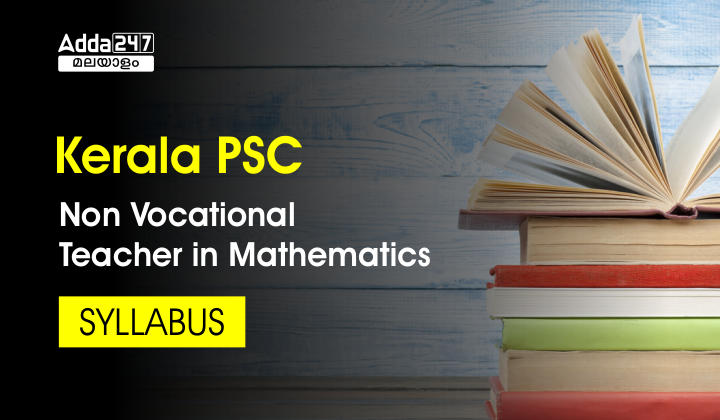Table of Contents
Non Vocational Teacher Mathematics Syllabus: Kerala Public Service Commission has published Non Vocational Teacher Mathematics Syllabus on its official website. If you have applied for the post of Non Vocational Teacher in Mathematics and would like to know the detailed syllabus, then your search ends right here. To crack the exam, one needs to have a clear understanding of the syllabus, therefore read through Non Vocational Teacher Mathematics Syllabus to broaden your perspective. You can also download Non Vocational Teacher Mathematics PSC Syllabus in PDF format.
Non Vocational Teacher Mathematics Syllabus 2023
Non Vocational Teacher Mathematics Syllabus 2023: പരീക്ഷയ്ക്കുള്ള തയ്യാറെടുപ്പുകൾ ആരംഭിക്കാൻ സമയമായി. പരീക്ഷയിൽ വിജയിക്കുന്നതിന്, സിലബസിനെക്കുറിച്ച് വ്യക്തമായ ധാരണ ഉണ്ടായിരിക്കണം, അതിനാൽ കേരള PSC നോൺ വൊക്കേഷണൽ ടീച്ചർ മാത്തമാറ്റിക്സ് സിലബസ് 2023 വിശദമായി വായിച്ച് മനസിലാക്കുക. നിങ്ങൾക്ക് Non Vocational Teacher Mathematics Syllabus PDF രൂപത്തിൽ ഡൗൺലോഡ് ചെയ്യാവുന്നതാണ്.
Fill the Form and Get all The Latest Job Alerts – Click here
Kerala PSC Non Vocational Teacher Mathematics Syllabus: Overview
ചുവടെ നൽകിയിരിക്കുന്ന പട്ടികയിൽ Kerala PSC Non Vocational Teacher Mathematics Syllabus സംബന്ധമായ എല്ലാ പ്രധാനപ്പെട്ട വിവരങ്ങളും ലഭിക്കും.
| Kerala PSC Non Vocational Teacher Mathematics Syllabus | |
| Organization | Kerala Public Service Commission |
| Category | Exam Syllabus |
| Department | Kerala Vocation Higher Secondary Education |
| Name of the Post | Non Vocational Teacher in Mathematics |
| Category No. | 73/2022 |
| Last Date to Submit Confirmation | 23rd March to 11th April 2023 |
| Mode of Examination | ONLINE/ OMR |
| Medium of Questions | English |
| Total Marks | 100 |
| Duration of Examination | 1 Hour 30 Minutes |
| Official Website | www.keralapsc.gov.in |
Kerala PSC Non Vocational Teacher Mathematics Exam Pattern
കേരള PSC നോൺ വൊക്കേഷണൽ ടീച്ചർ മാത്തമാറ്റിക്സ് പരീക്ഷയുടെ വിശാലമായ പരീക്ഷ പാറ്റേൺ ഇതാണ്:
- ഒബ്ജക്ടീവ് അടിസ്ഥാനത്തിലുള്ള പരീക്ഷയാണിത്.
- ആകെ 1.30 മണിക്കൂറാണ് പരീക്ഷാ ദൈർഘ്യം.
- ആകെ മാർക്ക് 100.
- ഓരോ ശരിയായ ഉത്തരത്തിനും 1 മാർക്ക് നൽകും.
- ഓരോ തെറ്റായ ഉത്തരത്തിനും 1/3 മാർക്ക് കുറയ്ക്കുന്നു.
| Non Vocational Teacher Mathematics Exam Pattern | ||
| Parts | Topics | Marks |
| Part I | Mathematics | 70 Marks |
| Part II | Teaching Aptitude, Research Methodology | 10 Marks |
| Part III | Salient Features Of the Indian Constitution, Social Welfare Legislations and Programmes, Renaissance in Kerala, | 10 Marks |
| Part IV | General Knowledge, and Current Affairs | 10 Marks |
Non Vocational Teacher Mathematics Syllabus PDF Download
Non Vocational Teacher Mathematics Syllabus PDF ഡൗൺലോഡ് ചെയ്യാൻ, താഴെ നൽകിയിരിക്കുന്ന ലിങ്കിൽ ക്ലിക്ക് ചെയ്യുക.
Non Vocational Teacher Mathematics Syllabus PDF Download
Kerala PSC Non Vocational Teacher Mathematics Syllabus 2023
PART I – Mathematics
Module I – Linear Algebra (7 Marks)
- Vector spaces, subspaces, linear dependence, basis, dimension, algebra of linear transformations. Algebra of matrices, rank, and determinant of matrices, linear equations. Eigenvalues and eigenvectors, Cayley-Hamilton theorem. Matrix representation of linear transformations. Change of basis, canonical
forms, diagonal forms, triangular forms-rational forms, Jordan forms. Inner product spaces, orthonormal basis. Quadratic form.
Module II – Real Analysis (7 Marks)
- Sequences and series, convergence, lim sup. lim inf. Bolzano Weierstrass theorem, Heine Borel theorem. Continuity, uniform continuity, differentiability, Rolle’s theorem, Mean value theorem. Sequences and series of functions- uniform convergence. Riemann sums and Riemann integral, Improper Integrals. Double and triple integrals,
Module III – Real Analysis(continued) (7 Marks)
- Lebesgue measure, Lebesgue integral. directional derivative, partial derivative, Functions of several variables, inverse and implicit function theorems. Special functions- Beta and Gamma functions, Fourier series.
Module IV – Abstract Algebra (7 Marks)
- Groups, subgroups, normal subgroups, quotient groups, homomorphisms, isomorphisms, cyclic groups, permutation groups, Cayley’s theorem, Direct products, Fundamental theorem for abelian groups, class equations, Sylow theorems.
Module V – Abstract Algebra (continued) (7 Marks)
- Rings, ideals, prime and maximal ideals, quotient rings, unique factorization domain, principal ideal domain, Euclidean domain. Polynomial rings and irreducibility criteria. Fields, finite fields, field extensions, Galois Theory.
Module VI – Topology (7 Marks)
- Metric spaces, continuity, Topological spaces, Base, subbase, countability properties, Separation axioms, Compact space, one-point compactification, locally compact space, connected spaces, path-wise connectedness, Quotient spaces, Product topology.
Module VII – Complex Analysis (7 Marks)
- Complex numbers, polar form, properties of complex numbers, Analytic functions, Cauchy Reimann equations, Conformal Mappings, Mobius transformation, Power series, Zeros of analytic functions, Liouvillis theorem, Complex integration, real integrals using complex integration, Cauchy’s theorem and Cauchy’s integral formula, Morera’s theorem, open mapping theorem, Singularities and its classification, residues, Laurent series, Schwarz lemma, Maximum modulus principle, Argument principle.
Module VIII – Functional Analysis (7 Marks)
- Normed Linear spaces, Continuity of linear maps, Banach spaces, Hahn Banach spaces, Open mapping theorem, closed graph theorem, uniform boundedness principle, Inner product spaces, Hilbert spaces Projections, Bounded operators, Normal, unitary, and self-adjoint operators.
Module IX – Ordinary Differential & Partial Equations (7 Marks)
- Existence and uniqueness of solutions of initial value problems for first-order ordinary differential equations, singular solutions of first-order ODEs, and system of first-order ODEs. The general theory of homogenous and non-homogeneous linear ODEs. Lagrange and Charpit methods for solving first-order PDEs, Cauchy problem for first-order PDEs. Classification of second-order PDEs, General solution of higher-order PDEs with constant coefficients, Method of separation of variables for Laplace, Heat, and Wave equations
Module X – Theory of Numbers (7 Marks)
- Fundamental theorem of arithmetic, divisibility in Z, congruences, Chinese Remainder Theorem, Euler’s Ø-function, Fermat’s theorem, Wilson’s theorem, Euler’s theorem, primitive roots.
PART II
RESEARCH METHODOLOGY and TEACHING APTITUDE
I. TEACHING APTITUDE
- Teaching: Nature, objectives, characteristics, and basic requirements;
- Learner’s characteristics;
- Factors affecting teaching;
- Methods of teaching;
- Teaching aids;
- Evaluation systems.
II. RESEARCH APTITUDE
- Research: Meaning, Characteristics, and Types;
- Steps of research;
- Methods of research;
- Research Ethics;
- Paper, article, workshop, seminar, conference, and symposium;
- Thesis writing: its characteristics and format.
PART III
Salient Features of the Indian Constitution
- Salient features of the Constitution – Preamble- Its significance and its place in the interpretation of the Constitution.
Fundamental Rights – Directive Principles of State Policy – Relation between Fundamental Rights and Directive Principles – Fundamental Duties.
Executive – Legislature – Judiciary – Both at Union and State Level. – Other Constitutional Authorities.
Centre-state Relations – Legislative – Administrative and Financial.
Services under the Union and the States. Emergency Provisions. Amendment Provisions of the Constitution.
Social Welfare Legislations and Programmes
- Social Service Legislations like the Right to Information Act, Prevention of Atrocities against Women & Children, Food Security Act, Environmental Acts, etc., and Social Welfare Programmes like the Employment Guarantee Programme, Organ and Blood Donation, etc.
RENAISSANCE IN KERALA
TOWARDS A NEW SOCIETY
- Introduction to English education – various missionary organizations and their functioning- the founding of educational institutions, factories, printing press, etc.
EFFORTS TO REFORM THE SOCIETY
- (A) Socio-Religious reform Movements
SNDP Yogam, Nair Service Society, Yogakshema Sabha, Sadhu Jana Paripalana Sangham, Vaala Samudaya Parishkarani Sabha, Samathwa Samajam, Islam Dharma Paripalana Sangham, Prathyaksha Raksha Daiva Sabha, Sahodara Prasthanam, etc. - (B) Struggles and Social Revolts
Upper cloth revolts. Channar agitation, Vaikom Sathyagraha, Guruvayoor Sathyagraha, Paliyam Sathyagraha. Kuttamkulam Sathyagraha, Temple Entry Proclamation, Temple Entry Act. Malyalee Memorial, Ezhava Memorial, etc. Malabar riots, Civil Disobedience Movement, Abstention movement, etc.
ROLE OF THE PRESS IN RENAISSANCE
- Malayalee, Swadeshabhimani, Vivekodayam, Mithavadi, Swaraj, Malayala Manorama, Bhashaposhini, Mathnubhoomi, Kerala Kaumudi, Samadarsi, Kesari, AI-Ameen, Prabhatham, Yukthivadi, etc
AWAKENING THROUGH LITERATURE
- Novel, Drama, Poetry, Purogamana Sahithya Prasthanam, Nataka Prashtanam, Library movement, etc
WOMEN AND SOCIAL CHANGE
- Parvathi Nenmenimangalam, Arya Pallam, A V Kuttimalu Amma, Lalitha Prabhu.Akkamma Cheriyan, Anna Chandi, Lalithambika Antharjanam and others
LEADERS OF RENAISSANCE
- Thycaud Ayya Vaikundar, Sree Narayana Guru, Ayyan Kali.Chattampi Swamikal, Brahmananda Sivayogi, Vagbhadananda, Poikayil Yohannan(Kumara Guru) Dr. Palpu, Palakkunnath Abraham Malpan, Mampuram Thangal, Sahodaran Ayyappan, Pandit K P Karuppan, Pampadi John Joseph, Mannathu Padmanabhan, V T Bhattathirippad, Vakkom Abdul Khadar Maulavi, Makthi Thangal, Blessed Elias Kuriakose Chaavra, Barrister G P Pillai, TK Madhavan, Moorkoth Kumaran, C. Krishnan, K P Kesava Menon, Dr Ayyathan Gopalan, C V Kunjuraman, Kuroor Neelakantan Namboothiripad, Velukkutty Arayan, K P Vellon, P K Chathan Master, K Kelappan, P. Krishna Pillai, A K Gopalan, T R Krishnaswami Iyer, C Kesavan. Swami Ananda Theerthan, M C Joseph, Kuttippuzha Krishnapillai, and others
LITERARY FIGURES
- Kodungallur Kunhikkuttan Thampuran, Kerala Varma Valiyakoyi Thampuran, Kandathil Varghese C Mappila. Kumaran Asan, Vallathol Narayana Menon, Ulloor S Parameswara Iyer, G Sankara Kurup, Changampuzha Krishna Pillai, Chandu Menon, Vaikom Muhammad Basheer. Kesav Dev, Thakazhi
Sivasankara Pillai, Ponkunnam Varky, S K Pottakkad and others
PART IV
GENERAL KNOWLEDGE AND CURRENT AFFAIRS (10 Marks)




